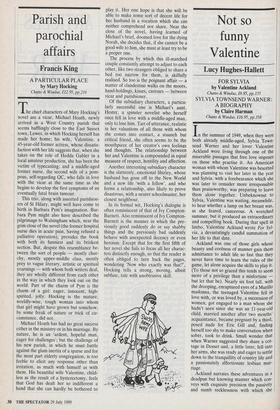Parish and parochial affairs
Francis King
A PARTICULAR PLACE by Mary Hocking Chatio & Windus, f12.95, pp-216 he chief characters of Mary Hocking's novel are a vicar, Michael Hoath, newly arrived in a West Country parish that seems bafflingly close to the East Sussex town, Lewes, in which Hocking herself has made her home; his wife, Valentine, a 45-year-old former actress, whose dissatis- faction with her life suggests that, when she takes on the role of Hedda Gabler in a local amateur production, she has been the victim of typecasting; and a middle-aged former nurse, the second wife of a pom- pous, self-regarding QC, who falls in love with the vicar at the same time as she begins to develop the first symptoms of an eventually fatal brain tumour.
This trio, along with assorted parishion- ers of St Hilary, might well have come to birth in Barbara Pym's imagination. Bar- bara Pym might also have described the pilgrimage to Walsingham which, near the grim close of the novel (the former hospital nurse dies in acute pain, having refused a palliative operation), provides the book with both its funniest and its briskest section. But, despite this resemblance be- tween the sort of people — mostly chur- chy, mostly upper-middle class, mostly prey to vague literary, artistic or spiritual yearnings — with whom both writers deal, they are wholly different from each other in the way in which they look out on the world. Part of the charm of Pym is the charm of a girl: eager, innocent, high- spirited, jolly. Hocking is the mature, worldly-wise, tough woman into whom that girl might have grown but somehow, by some freak of nature or trick of cir- cumstance, did not.
Michael Hoath has had no great success either in the ministry or in his marriage. By nature, he is an 'ardent, hopeful man, eager for challenges'; but the challenge of his new parish, in which he must battle against the glum inertia of a sparse and for the most part elderly congregation, is too feeble to elicit any response other than irritation, as much with himself as with them. His beautiful wife Valentine, child- less as the result of a hysterectomy, feels that God has dealt her so indifferent a hand that she can hardly be bothered to play it. Her one hope is that she will be able to make some sort of decent life for her husband in a vocation which she can neither comprehend nor share. Near the close of the novel, having learned of Michael's brief, doomed love for the dying Norah, she decides that, if she cannot be a good wife to him, she must at least try to be a proper one.
The process by which this ill-matched couple constantly attempt to adjust to each other, like two strangers obliged to share a bed too narrow for them, is skilfully realised. So too is the poignant affair — a matter of clandestine walks on the moors, hand-holdings, kisses, caresses — between vicar and parishioner.
Of the subsidiary characters, a particu- larly successful one is Michael's aunt, Hester, a spinster novelist who herself once fell in love with a middle-aged man, only to lose him. Tart of utterance, realistic in her valuations of all those with whom she comes into contact, a staunch but critical friend, she often seems to be the mouthpiece of her creator's own feelings and thoughts. The relationship between her and Valentine is compounded in equal measure of respect, hostility and affection.
Another interesting subsidiary character is the slatternly, emotional Shirley, whose husband has gone off to the New World and a new life 'with a fellow', and who forms a relationship, also likely to prove disastrous, with a neuter schoolmaster, her closest neighbour.
In its formal wit, Hocking's dialogue is often reminiscent of that of Ivy Compton- Burnett. Also reminiscent of Ivy Compton- Burnett is the manner in which the pre- viously good suddenly do or say shabby things and the previously bad suddenly behave with unexpected decency or even heroism. Except that for the first fifth of her novel she fails to focus all her charac- ters distinctly enough, so that the reader is often obliged to turn back the pages, wondering 'Now who exactly was that?', Hocking tells a strong, moving, albeit subfusc, tale with unobtrusive skill.


















































 Previous page
Previous page